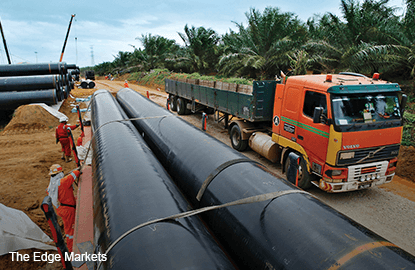
This article first appeared in The Edge Malaysia Weekly, on December 14 - 20, 2015.
 A construction industry executive recently rented a high-end condominium for about 30% less than the going rate a year ago. Why was the condominium so cheap? The property agent replied that the previous tenant — a high-ranking oil and gas (O&G) official — had lost his job.
A construction industry executive recently rented a high-end condominium for about 30% less than the going rate a year ago. Why was the condominium so cheap? The property agent replied that the previous tenant — a high-ranking oil and gas (O&G) official — had lost his job.
“It’s quite common now for O&G expatriates to lose their jobs, so the property market has also been impacted,” the agent said.
According to a senior executive in the once-booming oil and gas sector, as many as 7,000 to 8,000 executives have lost their jobs after the second round of industry-wide retrenchments in the country.
He has been told by colleagues that Petroliam Nasional Bhd (Petronas), Scomi Group Bhd and UMW Oil & Gas Corp Bhd have put a freeze on hiring and the list of companies doing the same is getting longer.
“Worse still, MMHE [Malaysia Marine and Heavy Engineering Holdings Bhd] is looking to discontinue the services of as many as 800 contractual workers, and Petronas is also mulling over a similar move,” he says.
Such moves are often denied and never publicised.
An MMHE official tells The Edge that the company only makes such announcements internally, but adds that she has not heard of recent staff-reduction exercises.
“MMHE, like most businesses, is operating in a very competitive industry and under tough economic conditions. Regrettably, this often has an unavoidable impact on staff,” an MMHE spokesperson says.
Nevertheless, the anxiety caused by the rumours is understandable considering MMHE in its annual report for FY2014 says that it has 3,220 employees spread out in its fabrication yards in Pasir Gudang and its corporate office in Menara Dayabumi, Kuala Lumpur. Thus, the 800 employees would work out to nearly 25% of its workforce.
According to the company’s annual report, staff costs amounted to RM358.78 million, with RM259.24 million going to wages and salaries. There was a termination benefit of RM25.65 million.
In June last year, MMHE undertook a mutual separation scheme (MSS) involving some 100 employees, with reports pegging the cost at about RM10 million.
Like other fabricators, the challenge that MMHE is facing is the lack of jobs to replenish its depleting order book as oil majors have slashed capital expenditure and halted new exploration and production activities amid the current low crude oil price environment.
Petronas had a RM300 billion capex programme over a five-year period beginning 2011 but has slashed it by 15% to 20% this year due to uncertain oil prices.
For the nine months ended Sept 30, MMHE posted a net profit of RM71.02 million and RM1.74 billion in revenue. In the previous corresponding period, net profit and revenue were down 37.40% and 20.55% respectively.
It is worth noting that MMHE is an indirect 66.5%-owned subsidiary of Petronas, which gives it strong parentage.
Other notable retrenchments were in early December last year, one being Pilgrim fund Lembaga Tabung Haji’s TH Heavy Engineering Bhd, a cash-strapped fabricator.
Earlier this year, SapuraKencana Petroleum Bhd let go of about 150 of its 13,000 employees.
The source adds that quite recently, Technip — the French oil and gas giant that has 8.5% equity interest in MMHE — laid off two hundred people locally, while Murphy Oil in Malaysia let go of about 100 employees. Petrofac RNZ is said to be looking to cut 100 jobs, as are Ranhill WorleyParsons and Aker Solutions, and stalwart Shell (in Malaysia) it said to be laying off about 200 staff, as some of its projects are being halted.
Such talk, although not verified, does paint a gloomy picture of the oil and gas sector.
It will be interesting to see if there will be a change of tack at Petronas. In April, president and CEO Datuk Wan Zulkiflee Wan Ariffin denied rumours of a lay-off and wage cuts. “There will be no salary cut for Petronas staff, including Petronas Carigali. There will be no retrenchment of Petronas staff,” he told the media.
In July, Deputy Minister in the Prime Minister’s Department Datuk Razali Ibrahim told Parliament that Petronas would not implement a VSS. “Petronas has 50,000 employees worldwide and looking at its current operations, it (Petronas) actually needs more (staff),” he said.
With the price of oil continuing to fall, will things change at Petronas? Crude oil prices have plunged more than 65% from US$107.62 per barrel in late July 2014 on the West Texas Intermediate to the current US$37 per barrel level.
Save by subscribing to us for your print and/or digital copy.
P/S: The Edge is also available on Apple's AppStore and Androids' Google Play.